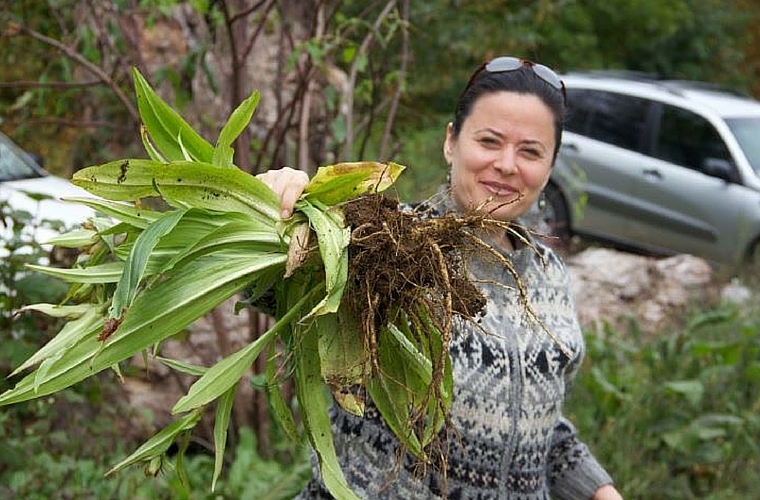Image courtesy of Goldthread Herbs
You might know by now that adaptogens are one category of plants I absolutely love.
Does this group of herbs intrigue you with their ability to bring the body to balance? These plants are true wellness promoters. I promised to tell you about Ashwagandha and its’ health benefits.
This amazing plant comes from India. It has many names including Indian ginseng, winter cherry, and others.
It’s a proud member of the Nightshade family similar to potatoes, tomatoes, peppers, eggplants and tobacco. Ashwagandha is a common ingredient in Ayurvedic medicine. Its’ Latin name Withania somnifera means sleep-inducing.
The first time I ever heard about Ashwagandha was from a British teacher and herbalist Annie McIntyre. I loved the story she shared.
She had a patient who came to see her to feel stronger and more energetic. She taught him about a root with a strong smell. Ashwagandha translates to “smells like a horse sweat”.
When the patient returned for another visit he was very excited to report that he indeed now felt strong ‘like a horse’. Annie wasn’t certain if his mind helped him to embrace the effects or if it was all due to the Ashwagandha.
In either case, her patient was very happy about his improving energy levels and libido.
I, on the other hand, was very excited the first time I got to harvest Ashwagandha during William Siff’s herbal apprenticeship program. In Massachusetts, where I live, Ashwagandha is an annual crop. The fruit look like tiny tomatoes, but it’s all about getting to the healing root.
Ashwagandha root has some pretty amazing benefits.
1. Ashwagandha is an adaptogen.
It’s commonly recommended to patients with fatigue. It’s worth exploring why Ashwagandha is considered to be a rejuvenator. You might also want to check out why it’s given the name of Indian ginseng. There is interesting research that looks at the plant’s adaptogenic activity in the treatment of chronic stress and its use in integrative cancer care.
2. Ashwagandha is considered to be calming and relaxing.
Research looks at its use for anxiety and stress. You can also find information about herb’s activity in schizophrenia, bipolar disorder, Parkinson’s disease and neurodegenerative disorders. Traditional uses also include insomnia and poor memory.
3. Ashwagandha has been studied and used for infertility disorders in men.
Research looked at enhancing sperm quality and regulating reproductive hormone levels in men taking this plant.
4. Ashwagandha is anti-inflammatory and antispasmodic.
It’s used for enhancement of muscle strength and recovery and improving athletic endurance.
5. Ashwagandha in an immunomodulator/immune amphoteric.
It’s recommended to patients with immune deficiency conditions including cancer and rheumatoid arthritis.
Ashwagandha is often cooked in milk. It can also be added to honey and ghee to prepare a jam called chyavanprash.
I have seen it combined with other roots and spices to prepare lovely chai teas. You can use powder to create herbal truffles.
Before deciding to use Ashwagandha make sure you are not sensitive to the Nighshade family of plants.
This means that you can eat tomatoes, potatoes, eggplants and peppers without an allergic reaction. You might’ve heard that green tomatoes or potatoes are not safe to eat.
This is important to keep in mind – plants from this family have a variety of compounds in them, some are nutritious and super beneficial and others we need to be very respectful of.
Patients taking thyroid hormone replacement or barbiturates should also avoid using Ashwagandha.
Questions: If you have trouble sleeping, would you consider learning more about Ashwagandha? Which of the other 4 main researched uses of this plant do you find most interesting? Would you like to learn how to make a chai or herbal truffles with Ashwagandha?



4 Comments
Deb samuels-peretz
March 27, 2016 - 2:13 pmI like it for it’s anti-inflammatory properties. I’d love a chai or truffle recipe!
Lana Camiel
March 31, 2016 - 12:16 amThank you for the comment, Deb! Will share chai recipe soon. There are several good truffle recipes here – https://www.lanacamiel.com/herbal-truffles/
Drew Mirque
March 28, 2016 - 6:17 pmLana… I’m wondering: do you know if this plant can grow in our growing zone in the Boston area? I see you holding an uprooted plant, but not sure where you are in that pix.
Lana Camiel
March 31, 2016 - 12:14 amDrew, thank you for your question! I was in western Massachusetts – Goldthread Farm, so yes, it can grow in our zone.